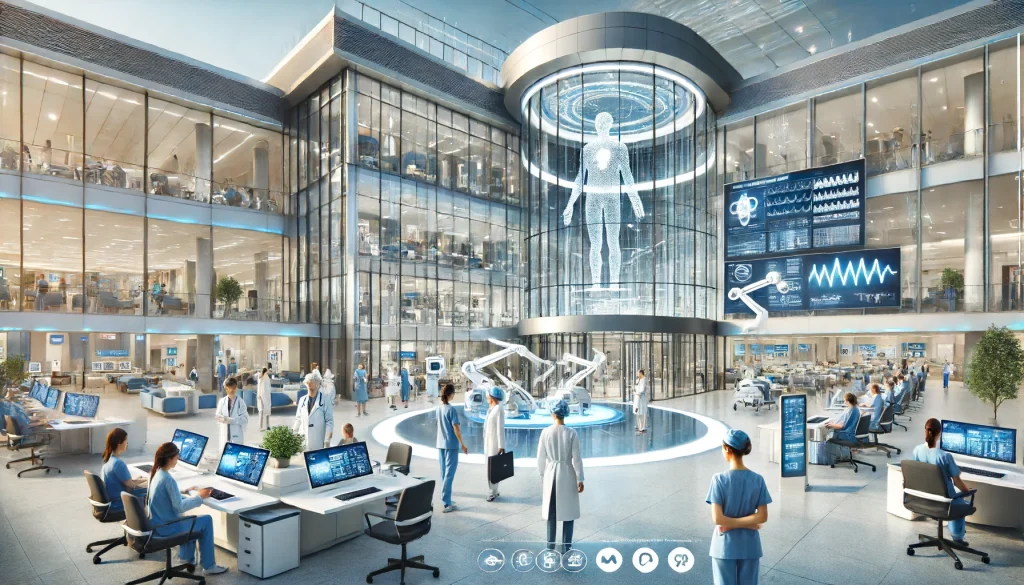
Artificial intelligence (AI) is rapidly transforming healthcare, enhancing both patient care and administrative processes. As the complexity and volume of data grow, AI’s role is set to expand, bringing both opportunities and challenges for healthcare professionals.
Transformative Applications of AI
AI is already making significant strides in various healthcare domains. In diagnosis and treatment, AI algorithms are now outperforming radiologists in spotting malignant tumors and assisting researchers in clinical trials. Tools like AI-driven chatbots and virtual health assistants are improving patient engagement and adherence by reminding patients to take medications and follow treatment plans.
On the administrative side, AI is automating routine tasks such as billing, claims processing, and updating patient records. This automation frees up valuable time for healthcare workers, allowing them to focus on more critical and complex tasks.
Key AI Technologies
Several specific AI technologies are making a significant impact in healthcare:
- Machine Learning: Widely used in precision medicine to tailor treatments to individual patients. IBM Watson for Oncology, for example, provides evidence-based treatment recommendations.
- Natural Language Processing (NLP): Helps in creating and analyzing clinical documentation and transcribing patient interactions. Tools like Nuance’s Dragon Medical One automate note-taking, saving physicians time.
- Expert Systems: Rule-based systems embedded in electronic health record (EHR) systems to provide clinical decision support.
- Physical Robots: Used in surgeries to enhance precision, like the da Vinci Surgical System, and in hospitals to deliver supplies, reducing staff workload.
- Robotic Process Automation (RPA): Automates structured digital tasks such as prior authorizations and claims processing, increasing efficiency and reducing errors.
Real-World AI Tools
Several AI tools currently in use highlight the technology’s potential:
- PathAI: Assists pathologists in diagnosing diseases by analyzing pathology slides.
- Aidoc: Analyzes medical images to help radiologists identify critical conditions.
- Zebra Medical Vision: Detects conditions through medical imaging, enhancing diagnostic accuracy.
- DeepMind Health: Uses AI to predict patient deterioration and improve treatment outcomes. They have recently joined Google health’s team
Challenges and Barriers
Despite its potential, AI adoption in healthcare faces several obstacles. Integrating AI into existing clinical workflows and EHR systems is challenging. AI systems also require vast amounts of high-quality data, which can be difficult to obtain and manage. Additionally, ethical concerns such as transparency, accountability, and potential biases in AI algorithms must be addressed to ensure fair and ethical use.
Impact on Healthcare Workers
AI is poised to augment rather than replace healthcare professionals. Workers will need to adapt to new technologies and may shift to roles emphasizing uniquely human skills like empathy and big-picture thinking. However, roles involving routine digital tasks, such as radiology and pathology, are more susceptible to automation.
Ethical Considerations
The use of AI in healthcare raises important ethical issues. Many AI algorithms, especially deep learning models, are complex and difficult to interpret, making transparency a significant challenge. Ensuring accountability for mistakes made by AI systems in diagnosis and treatment is crucial. Additionally, patient data must be used ethically and securely to protect privacy.
The Future of AI in Healthcare
AI has the potential to revolutionize healthcare, particularly in areas like precision medicine, diagnostic imaging, and patient engagement. Overcoming integration challenges, securing regulatory approval, and ensuring ethical use are essential for widespread adoption. AI is set to augment human clinicians, enhancing their ability to provide care and allowing them to focus on tasks that require human judgment and empathy.
In conclusion, while AI promises significant advancements in healthcare, addressing the associated challenges and ethical concerns is vital to ensure these technologies benefit both healthcare providers and patients. As AI continues to evolve, it will undoubtedly play a crucial role in shaping the future of healthcare.

